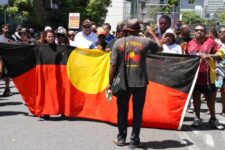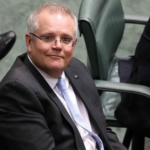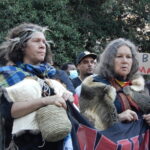Aboriginal People Twice As Likely to be Sentenced to Imprisonment, Study Finds

The global Black Lives Matter protests earlier this year, sparked by the death in America of George Floyd, highlighted an uncomfortable truth for many Australians – that our Indigenous people are often treated unfairly by police. In fact, racism in Australian police forces is a topic that’s well documented, if not always at the forefront of mainstream media.
But racism runs deeper into the justice system than just the police force, with figures released recently by the New South Wales Bureau of Crime Statistics and Research (BOCSAR) showing that Indigenous people are twice as likely to be given a prison sentence than non-Indigenous people when facing court for similar offences.
Indigenous people are grossly over-represented in our prisons, making up only around 3 percent of the Australian population, but more than one-quarter of the prison population. More than one-third of adult women behind bars are Aboriginal or Torres Strait Islander. Appallingly, the statistics are worse for Indigenous youth. They are 24 times more likely to be locked up than non-Indigenous children.
What’s more – for some Indigenous Australians – even a short prison term or a stay in a police cell can result in death.
Since the 1987 Royal Commission, there have been a further 400 Indigenous deaths in custody, most of which could have been avoided. Tanya Day, for example, died in hospital from a brain haemorrhage, which was caused after she fell and hit her head five times within the first hour of being placed in a cell in a Victorian police station.
Then there is the tragic story of Ms Dhu, who was serving three days jail time for unpaid fines at the South Hedland Police Station in Western Australia. She died in hospital of septicaemia and pneumonia caused by broken ribs. During an inquest into her death, the Western Australian Coroner found that the actions of police – who thought Ms Dhu was “faking it”, had been both “unprofessional and inhumane” and that Ms Dhu could have survived if she had been given proper care.
Locked up for minor offences
Many indigenous people, particularly those in regional New South Wales usually find themselves in trouble with the law for relatively minor offences, for example driving offences and offensive language.
Former Magistrate David Helipern recently told the Sydney Morning Herald that in his experience, working in the Northern Rivers for many years, arresting people for a crime that doesn’t carry a jail term would often lead to what he called the “trifecta”: assault police, resist police and offensive language.
In New South Wales over the past ten years, the number of Aboriginal and Torres Strait Islander people charged by police has increased by more than 67 per cent.
So why do Indigenous Australians find themselves so often in trouble with the law?
Targeted by Police
It’s a question with a thousand different answers. In some cases, they are systematically targeted by police
In 2018 it was revealed that the New South Wales Police have a secret watch list which has more than 300 youths on it. Half of them are Aborginal or Torres Strait Islander. The Suspect Target Management Program (STMP) is managed internally – there is no specific legislation to govern its operations, and the quantitative risk assessment tool used to assess potential targets is unavailable to the public.
The program permits any police officer to nominate individuals as possible targets. And it’s not just past offenders who are being placed on the STMP, anyone police merely consider have the potential to commit crimes can be placed on it.
Once on the list, targeted children are then repeatedly stopped and searched by officers, sometimes dozens of times a year and are also regularly visited at home by police.
In other cases, Indigenous people find themselves on the wrong side of the law simply because of circumstance.
Disadvantaged across all areas
To Australia’s eternal shame, by every single standard of living measure available, Indigenous Australians fall way behind, whether it is housing, health and well-being, mortality rates, education, or employment.
Other contributing factors such as poverty, lack of social support, systemic drug and alcohol abuse in families, and family violence very often mean that Aboriginal people usually don’t have a lot of options to choose from.
For most, even obtaining something as simple as a driving license can be an insurmountable hurdle.
On top of this, they face inherent racism in the justice system.
Courts are predominantly the domain of white Australian males – lawyers, judges and jurors as well as ‘expert’ witnesses who provide specialist testimony or report writing. And here’s another statistic: despite First Nations people comprising over a quarter of people before criminal courts, juries comprise over 99 percent of non-Indigenous people.
So how do we change it?
There have long been calls for greater government investment in judicial alternatives for Indigenous Australians, such as expanding the current First Nations sentencing courts which engage Elders, family, victims and support people to determine the appropriate outcome. The hearings are often in places that are less formal and enact processes that are more deliberative, collective and support-based.
Koori courts in NSW have been proven to improve outcomes, including lower rates of imprisonment than for those sentenced in mainstream court settings. Research also suggests that Koori courts help to strengthen the social and cultural ties, which have a more positive impact on emotional wellbeing.
So there is change occuring, albeit slowly. And while keeping Indigenous Australians out of jail absolutely requires changes to the justice system, it also requires change to the social status quo too.
As former Head of Law Council of Australia Fiona McLeod said – some of the answers are painstakingly obvious:
“If you’re jailing people because they’re disqualified from driving, but they need to drive, they’re going to continue to drive,” she said. “If you assist them to get a licence then you solve the problem.”
“Rather than jailing a child for stealing a bottle of soda water, install drinking fountains instead. These solutions are so obvious that they have to be taken seriously.”







